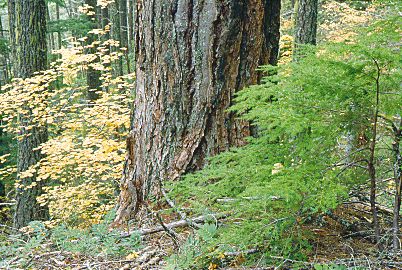Chapter 4.2
Interview with Barbara Kelly

Barbara Kelley moved to Oregon from Los Angeles in 1973. In 1979, she
founded Save Our ecoSystems (SOS) and in 1983, SOS filed a lawsuit in
federal court to stop the Bureau of Land Management (BLM) from spraying
herbicides. SOS won that lawsuit. Between 1985 and 1994, Kelley ran
the first copy shop that used only recycled paper. A Eugene resident since
1980, she's been active in a wide range of environmental issues, and is
currently focusing on wetlands reform. One of her favorite mottoes is,
"I can't grow my roots in cement."
Once upon a time,... Oregon was a land of thickly forested mighty trees, bears, wolves, eagles, clean, crisp air, pure delicious water, and salmon so abundant that the Klamath Indians used to hike over the Cascades for their yearly supply from our rivers; they then dried them and hike back. There were no forest managers.
But when the loggers came, they cut, and Cut, and CUT! Congress eventually let them cut our national forests, the people's forests. Land based universities such as OSU then staffed silviculturists who, in the past rationalized clearcutting, the spraying of toxic chemicals, and replanting our diverse native forests with a monoculture. They advocated the conversion of whole ecosystems to quickly produce a profitable cash crop. Although more enlightened foresters have sprung up, the old ways are still happening.
Monoculture promotes pestilence, single disease epidemics, and fast burning wildfires. Worse, it deprives wildlife of its original and necessary diverse habitat. In a natural forest, old and dying trees do indeed have insects in them. There are millions of insects in a healthy forest, kept in check by their predators (such as song birds) and parasites. When an old tree starts to die, insects swarm to the hardening sap. Woodpeckers (some varieties threatened or endangered) drill holes in the bark in order to eat the insects. Then, in the rainy season, the tiny holes become wells which develop fungi; these in turn draw squirrels and other creatures which tempt the keen-eyed hawks and eagles drifting high above. As the holes become larger, more creatures move in, until the old tree collapses. Having given its long life as a standing host, it now becomes the soft humus of the forest floor, feeding new life from the ground up.
Ecological cycles such as these have turned like perfectly engaged gears throughout time, eventually filling Earth, sky, field, forest, stream, and ocean with a myriad of inter-related species. Many of them are now threatened with extinction--one out of four mammal species, according to Bruce Babbit, Secretary of the Interior. The pace of these extinctions is increasingly alarming.
We need to distinguish between need and greed. There is no measure that pleases everyone. Each is flawed from someone's perspective. For individuals actually dependent upon logging for their livelihoods, in contrast to multinational corporations, government, and wealthy individuals, Measure 64 might be fine tuned after it has been passed by the legislature. For now, it offers us a rare opportunity to start reversing the mindless destruction of Oregon's forests, waterways, fish, wildlife, and air, that has been wrought by the greedy and unopposed by the legistature for so long.
The woman on your TV who tells you to vote no on Measure 64 is paid by the "Healthy Forest Alliance" (a deceptive name) for her outdoorsy good looks and her ability to deliver theur message. She claims to have "nurtured" these trees for a lifetime and pleads the case for the use of toxic chemicals, while standing in a highly managed, even aged tree farm. Unfortunately the water and air from such places is laden with these toxic chemicals and they do not stop at the property line.
Vote yes on 64 for Oregon and for your own health.
for life,
Barbara Kelly, Director S.O.S.
Table of Contents
Chapter 4 Intro/Chapter 4.1/Chapter 4.2/Chapter 4.3/
Chapter 4.4/Chapter 4.5
Copyright (c) 1997-98 OLIFE -- Oregonians for Labor Intensive Forest Economics.
All rights reserved.
|



